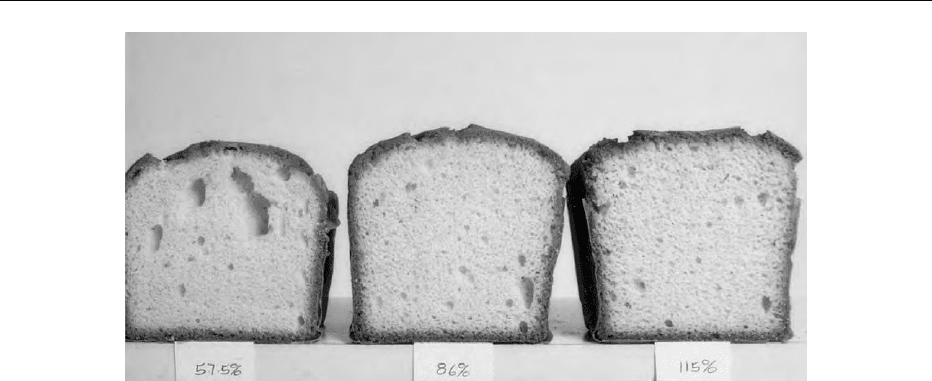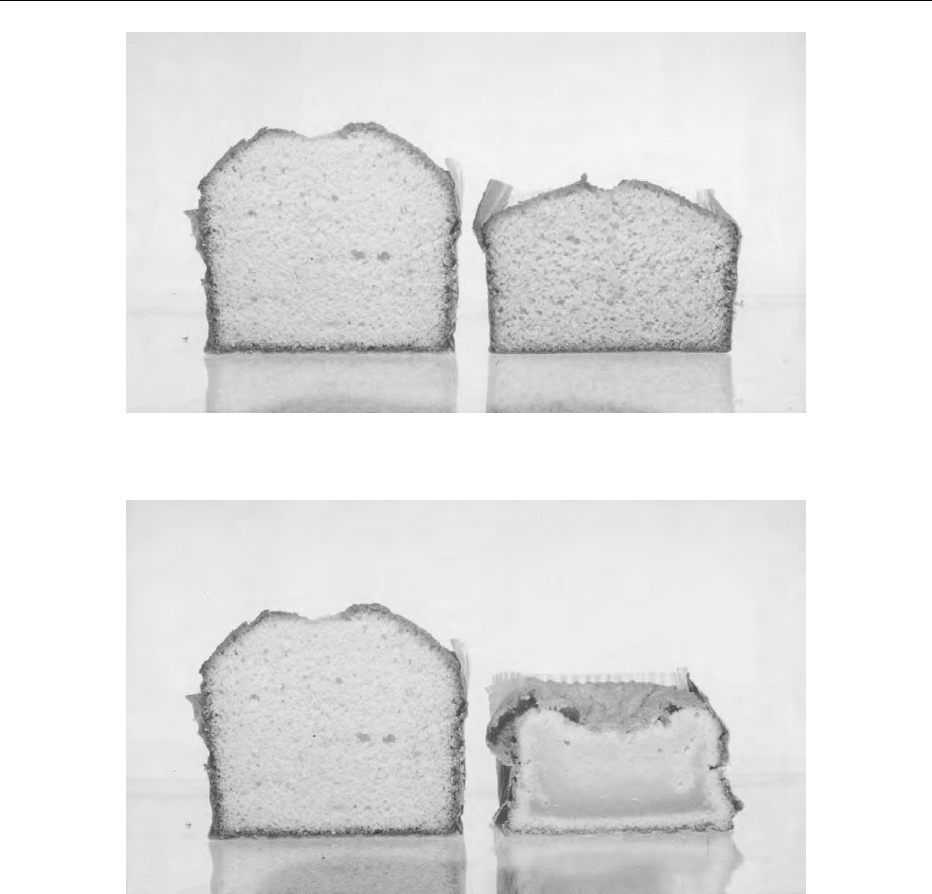Caballero B. (ed.) Encyclopaedia of Food Science, Food Technology and Nutrition. Ten-Volume Set
Подождите немного. Документ загружается.


its ubiquitous use and popularity, an enormous
investment has been made to examine health issues
associated with its regular use.
Caffeine Consumption
0005 There are various vehicles for caffeine consumption:
some are internationally recognized, such as tea and
coffee, but others are only locally consumed, e.g.,
mate
´
in South America and miang in Thailand.
Worldwide, the average caffeine consumption is esti-
mated at 50 mg per day.
0006 The properties of caffeine have been known since
preliterate times, when its use was confined to specific
areas – those where coffee plants grew wild (e.g., Ethi-
opia), until the time of European colonization, in the
seventeenth century. At this time, caffeine-containing
products were cultivated and subsequently became
widely distributed. The combined physiological and
psychological impact of caffeine depends on the pattern
and degree of exposure to the drug. Thus, there has
been extensive investigation into the caffeine content of
widely consumed beverages and their consumption.
Caffeine Content of Beverages and Food
0007 There is a marked variation in the estimates of caf-
feine content in different beverages. This arises from
differences in:
.
0008 methods of preparation, e.g., methods of brewing
tea and coffee;
.
0009 product source, e.g., black or green tea;
.
0010 reference volumes; and
.
0011 analytical methods.
Table 1 lists standard values that are widely quoted
with respect to caffeine content.
Caffeine Consumption Studies
0012 It is estimated that at least 80% of the adult popula-
tion in the majority of countries worldwide consume
caffeine on a regular (daily) basis. Variation exists in
the nature of the caffeine vehicle. In the UK, 81% of
adults drink tea, whereas in France, 81% drink
coffee. In the USA, it is estimated that only 52.1%
drink coffee, but more soft-drink beverages are con-
sumed than in other countries.
0013Data for estimating a population’s caffeine intake
have been available from prospective and retrospect-
ive studies. In general, the former has gained more
credence, and it has been shown repeatedly that there
is a good correlation between reported caffeine intake
and subsequent appropriate measurement of caffeine
or caffeine metabolite levels. Table 2 shows the esti-
mated mean intake of caffeine in several countries.
Pharmacokinetics of Caffeine
Absorption
0014Caffeine absorption from the gastrointestinal tract is
rapid. About 90% of the caffeine in a cup of coffee is
cleared from the stomach in 20 min, although the
stomach is also able to absorb this substance. A
wide variation in the time to reach peak plasma con-
centrations has been reported in humans (i.e., 15–
120 min). However, absorption may be slowed by
the presence of food in the intestine or when large
amounts of the drug are ingested. On an empty stom-
ach, the time taken is around 40 min, with 99%
absorbed after 45 min.
Distribution
0015Once absorbed, caffeine, because of its hydrophobic
properties, can pass through all biological mem-
branes, including the blood–brain barrier. Salivary
caffeine concentrations have been shown to correlate
closely with plasma concentrations, reaching up to
85% of plasma levels.
0016After oral ingestion of 5–8mgkg
1
in humans,
the peak plasma caffeine concentration equals 8–
10 mg l
1
. From this, it can be estimated that inges-
tion of a single cup of coffee, which provides a dose of
0.4–2.5 mg kg
1
, would give a peak concentration of
0.25–2.0 mg l
1
. In normal adults, the plasma half-
life is between 3 and 7 h. Whereas there is little or no
difference with increasing adult age, premature and
full-term neonates show a markedly increased plasma
tbl0001 Table 1 Caffeine content of beverages and foodstuffs
Drink Caffeine content
Coffee
Ground roast 85 mg per 150 ml
Instant 60 mg per 150 ml
Decaffeinated 3 mg per 150 ml
Te a
Leaf or bag 30 mg per 150 ml
Instant 20 mg per 150 ml
Cola 18 mg per 180 ml
Caffeine-free cola 0
Cocoa (hot chocolate) 4 mg per 150 ml
Chocolate milk 4 mg per 150 ml
Chocolate candy 5–20 mg per 100 g
tbl0002Table 2 Estimated average daily consumption in certain
countries
Country Meanintake (mg kg
1
)
USA 4
UK 3
Denmark 7
746 CAFFEINE

half-life, owing to the lower activity of cytochrome
P450 and the relative immaturity of some elimination
pathways. This state continues for up to 12 months
but is then essentially stable throughout life.
0017 Although the clearance rate is overall similar for
men and women, it is related to the menstrual cycle,
being slower in the luteal phase (6.85 h luteal vs.
5.54 h follicular). In the third trimester of pregnancy
there is a significant prolongation of the plasma half-
life (up to 15 h). In adult males who smoke, the caf-
feine half-life is decreased by up to 50% compared
with nonsmokers.
Caffeine Metabolism
0018 Caffeine is metabolized by the cytochrome P450
enzyme system. The major process is demethylation
at the C3 position to produce paraxanthine, which
accounts for up to 80% of caffeine metabolism. The
other 24 excretory products include theophylline
(1,3-dimethylxanthine), theobromine (3,7-dimethyl-
xanthine), and both uric acid and uracil derivatives.
Many of the metabolic steps may be saturable in
humans, as the elimination half-time for caffeine
and some of its metabolites is dose-dependent. Less
than 2% of the ingested dose of caffeine is recover-
able from the urine unchanged.
Mechanism of Caffeine Action
0019 Caffeine exerts a variety of pharmacological actions
at diverse sites, both central and peripheral. Whilst
several processes have been investigated as being
responsible for these effects, the mechanism must be
activated by caffeine consumption within normal
human amounts. This effectively rules out some
hypotheses (Table 3).
0020 Thus, the general consensus now is that the only
known mechanism that is significantly affected by the
relevant doses of caffeine (i.e., able to achieve an
extracellular concentration of 10–50 mM) is binding
to adenosine receptors and competitive antagonism
of adenosine. Although the effects of caffeine on be-
havior have been well documented, understanding of
its cellular mechanisms of action remains incomplete.
0021Adenosine receptors are widely distributed
throughout the body, which befits the mechanism of
caffeine action because of the substance’s wide range
of effects. For example, adenosine causes broncho-
constriction and negative inotropic effects on the
heart, and inhibits gastric secretions, lipolysis, and
renin release, all of which are the opposite of the
effects of caffeine. Centrally mediated effects of
adenosine are also the reverse of caffeine.
0022Four distinct adenosine receptors have been identi-
fied and cloned: A
1
,A
2A
,A
2B
, and A
3
. In humans, A
1
and A
2A
have been shown to be important, as the
other two are only stimulated with toxic concentra-
tions of caffeine. Whereas caffeine is equally active at
adenosine A
1
and A
2A
receptors, it has been shown
recently that the stimulatory central action of caffeine
is mainly mediated through an inhibition of transmis-
sion of adenosine A
2A
receptors.
Physiological Effects of
Caffeine – General
0023The effects of caffeine are legion. Table 4 summarizes
the effects of caffeine on the body, with the following
sections describing the physiological effects on the
functions of the cardiovascular, central nervous, and
neuroendocrine (including adrenomedullary) systems.
Psychological effects are considered separately.
Physiological Effects of Caffeine on the
Cardiovascular System
0024The effects on caffeine on the cardiovascular system
have been extensively researched in both experimen-
tal and epidemiological studies. It has generated
much interest because of the debate regarding the
tbl0003 Table 3 Mechanisms of caffeine action
Potentialmechanismof caffeine action Reference Relative caffeine
concentration required
for effectiveactivation
(1 ¼a cup of coffee)
Adenosine receptor antagonism Fredholm (1980) 1
Inhibition of phosphodiesterase 10
g-Aminobutyric acid receptor blockade Marangos et al. (1979) 20
Mobilization of intracellular Calcium McPherson et al. (1991) 500
Fredholm BB and Hedqvist P (1980) Modulation of neurotransmission by purine nucleotides and nucleosides. Biochemical Pharmacology 29(12):1635–
1643. Marangos PJ, Paul SM, Parma AM, Goodwin FK, Syapin P and Skolnick P (1979) Purinergic inhibition of diazepam binding to rat brain (in vitro). Life
Science 24(9): 851–857. McPherson PS, Kim YK, Valdivia H et al. (1991). The brain ryanodine receptor: a caffeine-sensitive calcium release channel.
Neuron 7(1):17–25.
CAFFEINE 747

involvement of caffeine in cardiovascular disease.
Experimental studies have investigated the effects
of controlled caffeine exposure, whereas epidemi-
ological studies have addressed the relationship of
caffeine to cardiovascular disease.
Caffeine and Blood Pressure
0025 The major cardiovascular effect of caffeine is periph-
eral vasoconstriction, resulting in elevated blood
pressure, which is not accompanied by an increase
in cardiac output. Acute tolerance to the pressor
response does occur in regular consumers but is
reinstated by a brief period of abstinence, as demon-
strated by the referenced studies. This may be as short
as 3 h. Other evidence has demonstrated that a second
cup of coffee induces a pressor effect, albeit dimin-
ished. Finally, ambulatory blood pressure measure-
ments on days of caffeine intake compared with
placebo days are higher in usual caffeine consumers.
Both systolic and diastolic blood pressures have been
reported as being more significantly affected by an
acute caffeine challenge.
0026 In addition, caffeine increases cardiovascular
responses to stress. This includes the pressor response
to mental or physical stress, as well as other
responses, e.g., cardiac output and forearm blood
flow. As caffeine has pressor effects, it has been rec-
ommended as a treatment for orthostatic and post-
prandial hypotension.
Caffeine and Heart Rate
0027 The effect of caffeine on heart rate is less well
defined. Consumption within normal limits has
been reported as being associated with a decrease,
an increase or no change in heart rate. Whilst
caution is advised with regard to tachyarrhythmias
induced by caffeine, this is associated with excessive
doses or underlying cardiac disease. Interestingly,
it is widely believed that caffeine is associated
with palpitations, tachycardia, and arrhythmias, by
physicians.
Physiological Effects of Caffeine on the
Central Nervous System
0028The physiological effects on the central nervous
system are manifold. These include the effects of caf-
feine on cerebral blood flow, cerebral metabolism,
and electrophysiological activity. The psychological
effects will be considered separately.
Cerebral Blood Flow
0029Caffeine causes cerebro-vasoconstriction 30 min after
ingestion, via antagonism of the vasodilatory proper-
ties of endogenous adenosine. This effect was first
demonstrated over 60 years ago. A dose of 250 mg
of caffeine causes a decrease in cerebral blood flow of
15–18% as measured by the Xenon inhalation tech-
nique. The effects of caffeine on cerebral blood flow
have been demonstrated to last for 90 min and are
independent of mood and arterial partial pressure of
carbon dioxide.
Cerebral Metabolism
0030Following caffeine administration, the stimulant
effects on the central nervous system (CNS) are asso-
ciated with changes in local rates of cerebral
energy metabolism. In rat studies, a caffeine dose of
10 mg kg
1
causes increases in the motor and limbic
systems, as well as the thalamus (specific nuclei only),
substantia nigra, ventral tegmental areas, locus
ceruleus, and raphe nuclei. These changes in glucose
utilization correlate with changes in locomotor activ-
ity in rats and other behavioral modifications. The
multiple areas of the brain that are affected by caf-
feine mean that, although the primary action of caf-
feine is to block adenosine (a neuromodulator), other
neurotransmitters such as dopamine, norepinephrine,
serotonin, acetyl choline, and glutamate are involved.
Neuroelectrophysiology
0031Caffeine is a cerebral stimulant, and thus its effects
can be measured on an electroencephalograph. The
tbl0004 Table 4 Summary of the physiological effects of caffeine on the body
Effectof caffeine
Gastrointestinal system Increases gastric acid secretion in susceptible individuals, not related to gastric ulcers
Hepatic dysfunction increases caffeine half-life
Digestive absorption of alcohol is increased when caffeine is consumed beforehand
Respiratory system Relaxes bronchial smooth muscle
Increases CNS sensitivity to carbon dioxide
Renal system Stimulates renin release
Diuresis resulting from increased glomerular filtration rate and decreased tubular reabsorption
Adipose tissue Stimulates lipolysis
Bone tissue In large amounts, coffee can contribute to a negative calcium balance in those with a low calcium intake
748 CAFFEINE

most consistent results from a number of studies is
that moderate doses of caffeine effect the decrease in
spectral power in the lower alpha and theta ranges. In
addition, P300 amplitude increases with confidence,
attention, arousal level, and reward. Such changes
have been demonstrated with caffeine consumption.
Physiological Effects of Caffeine on the
Neuroendocrine Function
0032 The effects of caffeine in humans on the endocrine
system appear to be confined to the endocrine res-
ponse to stress, especially production of catechol-
amines and cortisol, although other hormones may
be important too, e.g., growth hormone. Plasma con-
centrations and urinary excretion of epinephrine and
norepinephrine are increased by caffeine consump-
tion. Although the methods of augmentation have
not been described in detail, it has been suggested
that caffeine-stimulated release of adrenomedullary
catecholamines is mediated by peripheral sympa-
thetic nerves. Thus caffeine antagonism of adensoine
receptors may result in increased sympathetic stimu-
lation of the adrenal gland, leading to increased thy-
roxine hydroxylase activity and thus catecholamine
synthesis. Like increased adrenaline production, nor-
epinephrine synthesis is controlled centrally by sym-
pathetic outflow.
0033 Cortisol production is similarly augmented by caf-
feine and stress. This is thought to be mediated by an
increase in adrenocorticotrophin. This action could
also be partly due to caffeine’s action on prosta-
glandins. The effects of caffeine on growth hormone
and prolactin are less well defined.
Psychological Effects of Caffeine
Consumption
0034 Having previously discussed the effects of caffeine at
a receptor and neuronal level, this section discusses
the effects of caffeine on psychological responses. A
large number of functions are affected, which would
be beyond the range of this review, and so three
specific functions are considered.
Behavior
0035 Caffeine is erratically self-administered in animal
models of drug self-administration. In humans, both
self-administration and choice procedures have
shown that caffeine acts as a reinforcer. In choice
studies, subjects typically first sample caffeine or pla-
cebo and later have the opportunity to choose to self-
administer one. Caffeine is chosen in preference to
placebo in subjects with or without a prior history of
caffeine consumption and is especially marked in
those with a history of drug abuse. To date, the mech-
anism of action of caffeine on behavior in humans has
not been extensively investigated. It is likely that an
interaction between adenosine and dopamine recep-
tors is important.
Performance
0036Owing to the enormous consumption of caffeine
worldwide, there has been a vast amount of work
on the performance effects of caffeine. It is far from
clear how the benefits and drawbacks of its consump-
tion balance out. In this section, the evidence for the
psychostimulant effects of caffeine on performance is
considered, as these are widely held to be the main
benefits of caffeine use.
0037Numerous placebo-controlled studies have been
published. Although the results are varied, with
some studies showing no effect of caffeine, taken as
a whole, they confirm a psychostimulant action of
caffeine.
0038Whilst a wide spectrum of cognitive tests have been
investigated in the above studies, usually, prior ab-
stinence of caffeine was required at least overnight.
This limits the relevance to caffeine consumption in
everyday life. The problem with caffeine deprivation
prior to testing, especially for a short period, means
that symptoms of caffeine withdrawal can be
invoked. Thus, it is not possible to describe the net
effects of caffeine with these studies, especially as
caffeine withdrawal has also been shown to decrease
performance in both humans and animals. However,
evidence in this area is inconclusive. A caffeine chal-
lenge of only 70 mg with 1.5 h of caffeine deprivation
has been shown to improve simple reaction time.
0039Another standpoint in this discussion is founded
on the demonstration of improved psychomotor
performance in noncaffeine-deprived individuals. A
large (9003 subjects) correlational study showed that
there was a relationship between habitual caffeine
consumption and performance (reaction time –
simple and choice, verbal memory, and visuospatial
reasoning), even when all variables were controlled
for.
Mood
0040The effects of caffeine on mood have been studied
extensively, and the results of these studies have been
more consistent than in other areas of caffeine re-
search. Caffeine in lower doses (up to 250 mg) has
positive effects on mood in both caffeine-deprived
and caffeine-tolerant studies. From these and many
other studies, the benefits of acute caffeine ingestion
on mood include an increase in energetic, confident,
and alert feelings, as well as motivation to work,
concentrate, or socialize.
CAFFEINE 749

Caffeine Withdrawal
0041 The phenomenon of the caffeine withdrawal syn-
drome is well substantiated and characterized in
detail. Table 5 lists the symptoms identified to occur
in the caffeine-withdrawn state.
0042 It is noteworthy that the prevalence of headache in
the general population is 27%, yet only 6% coffee
drinkers and 6% tea drinkers associate headache with
omission of caffeine intake.
0043 The time course for these symptoms to develop is
short. Overnight abstinence is part of the usual pat-
tern of caffeine consumption, and it is usual for with-
drawal symptoms to develop. The symptoms increase
for 24–48 h and then begin to improve. Usually, they
have subsided by day 7. A high daily intake of caf-
feine can lead to a prolongation of the symptoms for
up to 10 days or more. This may be explained by the
fact that the rate of caffeine metabolism may vary by
13-fold throughout the population. It has been shown
that caffeine consumption is directly related to the
symptoms of caffeine withdrawal. A dose of 100 mg
of caffeine per day is sufficient for caffeine with-
drawal symptoms to occur. Three days of caffeine
consumption is required before withdrawal symp-
toms occur.
0044 Much work has been published on the subjective
effects of caffeine withdrawal, but less work has con-
sidered performance. Although psychomotor impair-
ment is not associated with up to 18 h of caffeine
deprivation, impairments have been reported in a
variety of tasks after 24 h.
0045 The above summarizes the parameters whereby
caffeine withdrawal occurs in an otherwise healthy
population. It can be so disruptive to life that in 1994,
the American Psychiatric Society included it in the
DSM IV, although only as a ‘proposed,’ rather than
an official, category.
Therapeutic Uses
0046 A number of clinical uses have been suggested for
caffeine. However, the only widespread therapeutic
use at present is stimulating apneic premature infants.
Initially, theophylline was identified to increase the
respiratory rate, but caffeine had succeeded this
because of its wider therapeutic index. Following a
loading dose of caffeine, plasma caffeine levels are
maintained carefully between 10 and 20 mg l
1
.
0047Other applications for caffeine include treatment
of asthma and chronic obstructive pulmonary dis-
ease, because of its bronchodilatatory effects. In add-
ition, it has been used to extend the duration of
seizure, induced by electroconvulsive therapy. Uses
in hypotension and allergic rhinitis have also been
described. Caffeine may also aid the recognition of
hypoglycemia induced by treatment of diabetes mel-
litus. Finally, caffeine is available in over-the-counter
medicines for simple analgesia, cold remedies, and
stimulatory preparations.
See also: Behavioral (Behavioural) Effects of Diet;
Cocoa: Chemistry of Processing; Production, Products,
and Use; Coffee: Green Coffee; Roast and Ground;
Instant; Analysis of Coffee Products; Decaffeination;
Physiological Effects; Hormones: Adrenal Hormones;
Thyroid Hormones; Steroid Hormones; Hypertension:
Hypertension and Diet; Tea: Types, Production, and
Trade; Chemistry; Processing; Analysis and Tasting
Further Reading
Barone J and Roberts H (1996) Caffeine consumption.
Food and Chemical Toxicology 34: 119–129.
Debry G (ed.) (1994) Coffee and Health. Paris: John Libbey
Eurotext.
Nehlig A (1998) Are we dependent upon coffee and caf-
feine? A review on human and animal data. Neurosci-
ence and Biobehavioral Reviews 23: 563–576.
Silverman K, Evans SM, Strain EC and Griffiths RR (1992)
Withdrawal syndrome after the double blind cessation
of caffeine consumption. New England Journal of Medi-
cine 327: 1109–1114.
tbl0005Table 5 Symptoms of caffeine withdrawal
Increased Decreased
Irritability Well-being
Blurred vision Desire to talk/socialize
Drowsiness/sleepiness Urge to do work-related tasks
Yawning Energy/active
Lethargy/fatigue/tiredness/
sluggishness
Contentment
Thick head Flu-like feelings
Headache
Self-confidence
Heavy feeling in arms and legs
Hot or cold spells
750 CAFFEINE

CAKES
Contents
Nature of Cakes
Methods of Manufacture
Chemistry of Baking
Nature of Cakes
S P Cauvain, Campden and Chorleywood Food
Research Association, Chipping Campden, UK
Copyright 2003, Elsevier Science Ltd. All Rights Reserved.
Definition
0001 The definition of cake will vary slightly in different
parts of the world but essentially the term refers to
products which are characterized by formulations
based on (wheat) flour, sugar and (whole) eggs and
other liquids (milk), to which fat or oil may be added.
The level of added liquids is such that a low-viscosity
batter is formed rather than a dough. A key difference
between cake and bread is that the former is most
commonly baked in a mold, pan, or tin in order to
contain the batter and to form a product of a given
shape. Minimal processing of the batter is required
before baking.
0002 There is no significant gluten formation in cake
batters and, indeed, cake-making technology exploits
positive steps to prevent gluten formation. Modern
cakes are produced by forming a complex emulsion
and foam – the batter – which is processed by being
heat-set. As a broad generalization, modern cake
batters can be considered as fat, or oil, in water
emulsion systems. The aqueous phase contains the
dissolved sugar and suspended flour particles. In
many batter systems air bubbles are incorporated by
entrainment in the solid fat and they are held there
rather than the aqueous phase. However, as the batter
warms during baking, the air bubbles transfer from
the fat to the aqueous-phase foam and expand. Later
in the baking process the foam sets to yield the cake
structure.
0003 The key structure-forming component of cakes is
the starch contributed by wheat flour and the modifi-
cation of its gelatinization characteristics through the
addition of sugars and high levels of liquids (egg,
milk, water).
0004 Cakes are characterized by being relatively high-
density products, typically 0.4–0.7 ml g
3
, with a
tender-eating, friable crumb, and sweet taste. Their
final moisture contents typically lie in the region of
18–28%, lower than that of bread but higher than
that of pastries, biscuits, and cookies. The organolep-
tic and mold-free shelf-life of cake products varies
according to their formulations.
A Brief History of Cake Making
0005Representations of products described as ‘cakes’ are
known from the twelfth century bc in Egypt. To what
extent the products depicted equate to our modern
view of cake is uncertain. Baking molds appear to
have been used, since many of the products take the
form of animals of the time. For example, a fried
product resembling a snake is described. The first
likely use of sweet substances in cooking/baking
appears to belong to the ancient Greeks who knew
of the special properties of the ‘sackharon’ or ‘sweet
reed’ (sugarcane) from the Indian subcontinent. The
advance of cane sugar into the Middle East was com-
plete by about 700 bc. Sugar consumption continued
to rise and spread, first with the expansion of the
Roman Empire and later throughout medieval
Europe.
0006Early cake recipes were probably based on the use
of honey and in Roman times such confections were
made for special occasions such as the Saturnalia and
the New Year’s fair. Recipe books of the time
record the addition of honey to dough to make such
cakes. In the medieval period cake recipes and their
production are recorded in many European contexts.
Access to sugarcane gradually improved with the
voyages of discovery to the east and the Americas
and the production of sweetened cakes increased
and their forms proliferated through the sixteenth,
seventeenth, and eighteenth centuries ad.
Types of Cakes
0007The term ‘cake’ is taken to include the forms listed in
Table 1 and variants thereof. Cakes may be classified
into six arbitrary categories:
.
0008Low-fat sponges, containing less than 5% fat.
.
0009High-fat sponges, containing more than 5% fat.
CAKES/Nature of Cakes 751

.0010 Low-ratio cakes, in which the levels of sugar and
liquids in the formulation are individually less than
the flour weight.
.
0011 High-ratio cakes, in which the levels of sugar and
liquids in the formulation are individually greater
than the flour weight.
.
0012 Fruited cakes, which have a proportion of dried
vine fruits, fresh fruit, nuts, or other particulate
materials in the formulation.
.
0013 Chocolate cakes, containing a proportion of cocoa
solids.
Some examples of typical sponge and cake formula-
tions are given in Table 1.
The Nature and Roles of the Ingredients
Used
Flour
0014 Cakes can be manufactured with most types of wheat
flour. The most important contribution of the wheat
flour is the starch, the gelatinization of which forms
the major structural component of cakes. The hy-
drated wheat flour proteins form a significantly
weaker gluten structure in cake batters than in
bread dough because of the disruptive effects of the
recipe sugars and fats in the cake formulation. In
addition, the high levels of recipe liquids produce a
low-viscosity batter which reduces the ability of the
mixing action to impart the necessary energy for
gluten formation. A protein continuum may form in
the batter and this does make a small contribution to
cake strength and gives a firmer eating quality.
0015 Most commercial cake flours are characterized by
the following key features:
.
0016 Particle size – improved cake quality is obtained
when the particle size is reduced below that nor-
mally obtained from a standard flour-milling pro-
cess. This is usually accomplished by regrinding the
flour or through the application of air-classification
techniques. The aim of both methods of particle
size reduction is to free the starch granules from the
enveloping protein matrix. Ideally, the maximum
particle size of cake flours should be < 90 mm.
.
0017Postmilling treatment – the most common forms of
treatment are exposure to chlorine gas and dry-heat
treatment. Although the two treatment methods
are quite different, the resulting change in flour
properties is quite similar–notably, they cause
changes in the hydrophobicity of the starch gran-
ules. The treatment makes the flours more suited to
the production of the high-ratio type of cake. (Note
that treatment of cake flours with chlorine gas is
not now permitted in many countries.)
Sugars and Sweeteners
0018Sugar provides sweetness in cakes but also plays a
significant role in batter aeration and structure for-
mation. The influence on structural formation comes
from the effect of the sugar solution formed in the
batter on the gelatinization temperature of the starch.
The higher the sugar concentration, the higher the
starch gelatinization temperature and therefore the
longer the time that the batter has to expand before
it sets. Figure 1 illustrates the effects of increasing
sugar level.
0019The most common sugar used in cake making is
sucrose, though glucose and other sugars may be
used. If reducing sugars are used, there is a tendency
for discoloration of the crumb to occur at higher rates
of addition.
Eggs
0020Whole egg is a common component of cakes, provid-
ing color, flavor, aeration, and structure-forming
properties. The aeration and structure-forming prop-
erties come from the proteins which are present in the
egg white. The addition of fat will interfere with the
aeration power of egg proteins.
0021Some cake types, e.g., angel cake, may be made
without the use of egg yolks. Using only the egg
white confers a white color to the final product.
Milk
0022Milk products are commonly used to provide flavor
and a source of water to dissolve the added sugar.
Dried-milk products may also be used, provided an-
other source of water is added in the recipe. Skimmed
milk powder can be used for color and flavor. The
powder should have been heat-treated before use,
otherwise it may adversely affect product volume.
The heat treatment is required to denature the globu-
lins which are present, otherwise they can interfere
with the stability of the gas bubbles in the batter and
cause loss of product volume.
tbl0001 Table 1 Examples of cake formulations
Sponge cake High-ratio
cake
Chocolate
cake
Fruited cake
Flour 100 100 100 100
Sugar (sucrose) 105 115 130 120
Fat/oil 5 35 55 50
Baking powder 3 5 5 3
Whole eggs 50 30 30 45
Milk solids 5 6 8 5
Water 65 100 120 65
Cocoa powder 25
Dried vine fruits 140
Recipes are based on 100 parts (e.g., 100 g, 100 kg, 100 lb) of flour.
752 CAKES/Nature of Cakes

Water
0023 Water may be added to dissolve the recipe sugars,
especially if liquid milk products are not used.
Fats and Oils
0024 The addition of solid fat to a cake formulation is used
to provide tender eating qualities and restrict the
potential for gluten formation. The solid fat also
aids the incorporation and stabilization of air bubbles
in the batter. Polarization microscopy shows that,
when subjected to agitation, the fat crystals align
themselves around the air bubbles, thereby entrap-
ping and stabilizing them. This is possible because
the oil fraction in the fat allows the fat crystals to
move and at the same time adhere to one another like
links in a chain. It is apparent that in such a mechan-
ism the ratio of liquid to crystalline fat and the size of
the individual crystals are very important. If oil is
used in the batter, the bubble stabilization effects
will be absent and the cake will lack volume.
0025 The crystalline form of the fat is important in pro-
moting batter aeration. The three fat polymorphs of
concern are the alpha, beta-prime and beta. Air in-
corporation in cake batters is greatest with fats in the
beta-prime form, less with the alpha form, and least
with the beta form.
Emulsifiers
0026 Emulsifiers are used to aid the incorporation and
stabilization of air bubbles in the batter, especially in
the presence of fats or oils. The most commonly used
emulsifiers for this purpose are glycerol monostearate
(GMS) and polyglycerol esters, with the former being
the more effective of the two on a weight-for-weight
basis. Both emulsifiers are commonly used in a paste
form, i.e., dispersed in water with other ingredients
which promote gel stability. Emulsifiers like GMS
may exist in a number of forms when dispersed in
water and it is important it is in the active alpha-gel
form when used for cake making.
0027Without GMS the egg protein will largely stabilize
the air bubbles and the sponge will have a reasonable
volume, but often with an area of coarse open-cell
structure in the crumb. The addition of a small level
of GMS somewhat unexpectedly produces a worse
cake, with a dip in the top surface. It is apparent
from this result that the GMS and the egg proteins
do not combine their stabilizing power. At low levels
the GMS is able to stabilize the bubbles at low tem-
peratures, but it cannot continue to do so as the
temperature rises and the bubbles expand during
baking. Further increases in the level of added GMS
eventually provide a stable batter and improved cake
quality.
Baking Powders
0028A significant proportion of the final baked cake is
air. This is a mixture of gases, partly air incorporated
during mixing, and partly carbon dioxide generated
from the action of sodium bicarbonate with a suitable
food acid. The production of carbon dioxide gas
and its release when the batter first enters the
oven is an important part of the cake expansion
mechanism. Without this extra release of gas the
batter can only expand from the temperature effect
on the air trapped in the batter and the cake will
remain small in volume. Providing an extra release
of gas produces a larger cake specific volume and
gives it a more tender eating quality. The relative
importance of mechanical and chemical aeration is
shown in Figures 2 and 3.
fig0001 Figure 1 (see color plate 14) Cakes with (left) 57.5, (middle) 86 and (right) 115% sucrose based on flour weight.
CAKES/Nature of Cakes 753

0029 The action of the baking acid on the sodium bicar-
bonate normally proceeds to completion, i.e., to re-
lease all of the carbon dioxide gas from the mixture.
The flavor of the cake is influenced by the residual
salt from the acid–base reaction. The rate at which
carbon dioxide is released from the baking powder
reaction is controlled by using acids of different types.
The most commonly used baking acids and their rates
of addition to achieve neutrality with one part of
sodium bicarbonate are:
.
0030 Tartaric acid, 0.89, fast reaction
.
0031 Potassium hydrogen tartrate (cream of tartar),
2.25, fast reaction
.
0032 Acid calcium phosphate (monocalcium phos-
phate), 1.25, moderately fast reaction
.
0033Glucono-delta-lactone, 2.10, moderately fast reac-
tion
.
0034Sodium acid pyrophosphate, 1.33, slow reaction
.
0035Sodium aluminum phosphate, 1.00, slow reaction
Other Dry Ingredients
. 0036Whey solids may be used for color and flavor. The
powder should have been heat-treated before use
otherwise it may adversely affect product volume.
.
0037Cocoa powder is used in the production of choc-
olate cakes. It can come in several different forms.
.
0038Salt may be used for flavor and improving product
mold-free shelf-life.
.
0039Humectants such as glycerol and sorbitol may be
used to extend product mold-free shelf-life.
fig0002 Figure 2 (see color plate 15) Cake (left) with and (right) without chemical aeration.
fig0003 Figure 3 (see color plate 16) Cake (left) with and (right) without mechanical aeration.
754 CAKES/Nature of Cakes

.0040 Dried vine fruits are used in the production of
fruited cake varieties.
.
0041 Candied orange and lemon peel and glace
´
cherries
may be used in the production of fruited and speci-
ality cakes.
.
0042 Dried nuts may be added to fruited and speciality
cakes.
The Importance of Recipe Balance
0043 The final quality of cakes is strongly influenced by
the proportions of the ingredients that are used in the
recipe. Since the wheat flour provides the main struc-
ture-forming component – the starch – it is common
practice to construct the recipe based on the flour
weight and express the mass of other ingredients as
‘percentage flour weight’. This method of determining
ingredient levels has the advantage that it is possible to
deduce a series of ‘rules’ by which any cake recipe can
be constructed and the causes of quality losses rectified.
0044 Typical of the rules which are applied to cake
making include the following:
.
0045 The level of sugar will lie between 95 and 135%
flour weight for high-ratio cakes and 65 and 95%
for low-ratio cakes.
.
0046 The level of water should be equal to and not
exceed 1.25 times the sugar weight.
.
0047 The level of fat should not exceed the level of total
egg used (i.e., solids and water combined).
.
0048 The level of fat should not exceed the level of sugar.
Imbalances in ingredient ratios will manifest as qual-
ity losses in the baked product. Many more
specialized rules exist whereby the level of other func-
tional ingredients, e.g., baking powder, may be deter-
mined. The range of acceptable ingredients ratios
varies according to the type, size, and shape of cake
being made.
Cake Shelf-Life
Water Activity
0049 Cakes are commonly referred to as intermediate-
moisture food products because the moisture content
of typical cake products (approximately 18–28%) is
high enough to confer soft and tender eating proper-
ties. At such moisture contents cakes are susceptible
to microbial spoilage within a few days or weeks.
However, it is the water activity of a cake product
that controls the products microbial shelf-life rather
than the moisture content alone. Examples of water
activity in cakes are given in Table 2.
0050 The formulation of the cake recipe is the main
factor which affects its water activity and thus
its microbial shelf-life. Particularly important in con-
trolling water activity is the ratio of recipe water
to the soluble materials. The latter will include salt
and sugars. In addition, some other ingredients
which do not go into solution but which have the
ability to hold water and reduce its availability for
microbial activity may be present. An example of the
latter is flour which hydrates during mixing because
of the presence of proteins and damaged starch. On
baking, the flour proteins coagulate and the starch
gelatinizes.
0051When soluble materials like salt and sugar dissolve
in water they both reduce the vapor pressure of the
solution. The potential effect of a particular ingredi-
ent depends on its individual chemistry. For example,
salt is ionic and has a great affinity for water. Sucrose
and other sugars (e.g., glucose) do not possess that
same affinity of water and so for a given weight is less
effective than salt at locking up water. The sucrose
equivalent of an ingredient is often used to identify its
likely affect on cake water activity. Some typical su-
crose equivalents for cake ingredients are given in
Table 3. The sucrose equivalent is based on a method
which assigns a value of 1 to sucrose and compares all
ingredient effects on an equal-weight basis. Thus, in
Table 3 the value for salt is 11, which indicates that,
weight for weight, salt is 11 times more effective at
lowering product water activity than sucrose. Other
materials worthy of note are glycerol four times more
effective, sorbitol twice, and dextrose monhydrate
1.4. Many ingredients are much less effective than
sucrose and therefore have values of less than one.
Spoilage Inhibitors
0052Where the microbial shelf-life of cake products is
insufficient it is common practice to add a suitable
mold inhibitor to add to the effect of product water
tbl0002Table 2 Examples of water activity in cakes
Cake product Water activityrange
High-moisture cakes, such as carrot cake 0.9–0.95
Yellow, white, chocolate, and layer cakes 0.8–0.89
Fruited cakes 0.7–0.79
Celebration cakes 0.6–0.69
tbl0003Table 3 Sucrose equivalent of some bakery ingredients
Ingredient Sucrose equivalent
Salt 11.0
Glycerol 4.0
Sorbitol solids 2.0
Dextrose monohydrate 1.4
Sucrose 1.0
Flour 0.2
CAKES/Nature of Cakes 755
